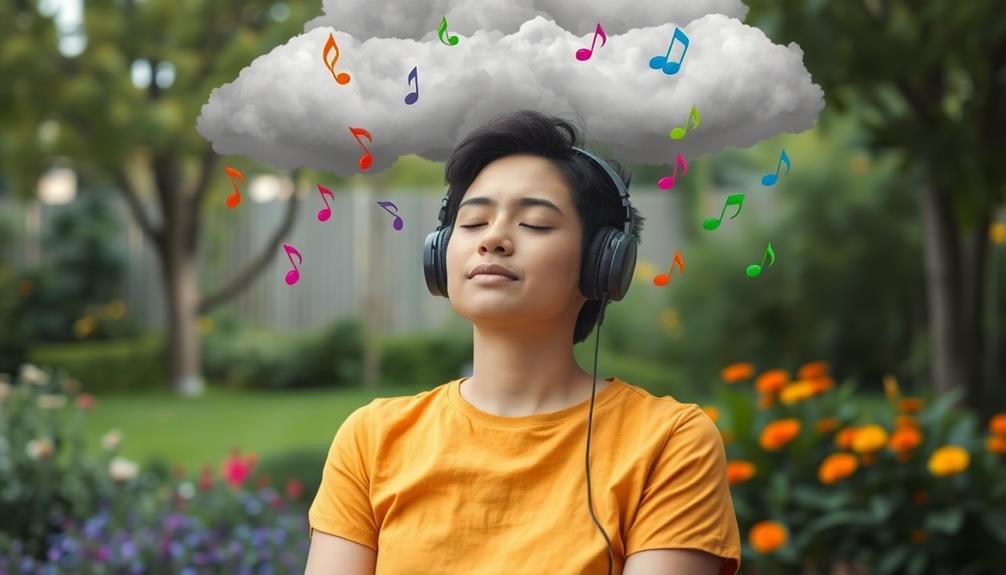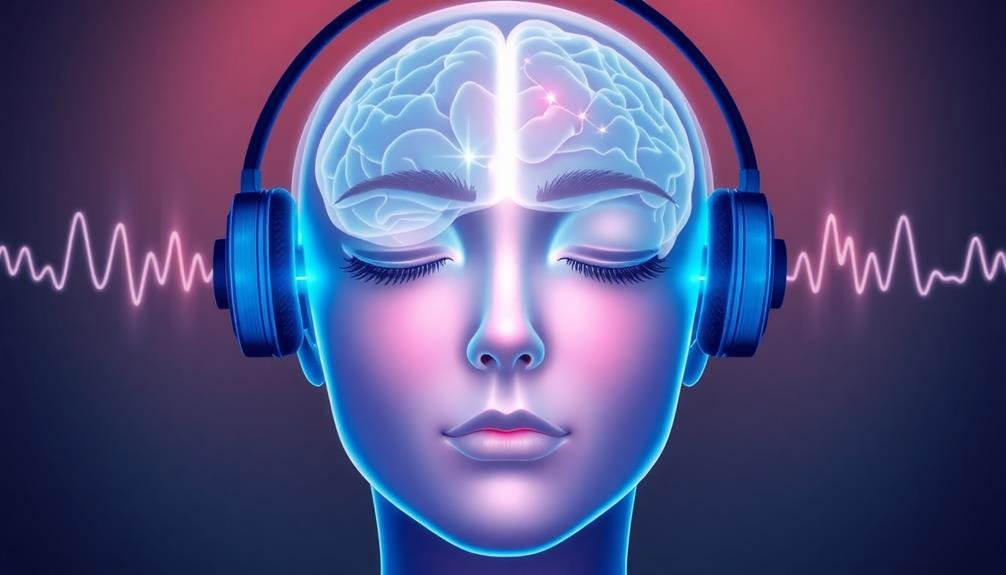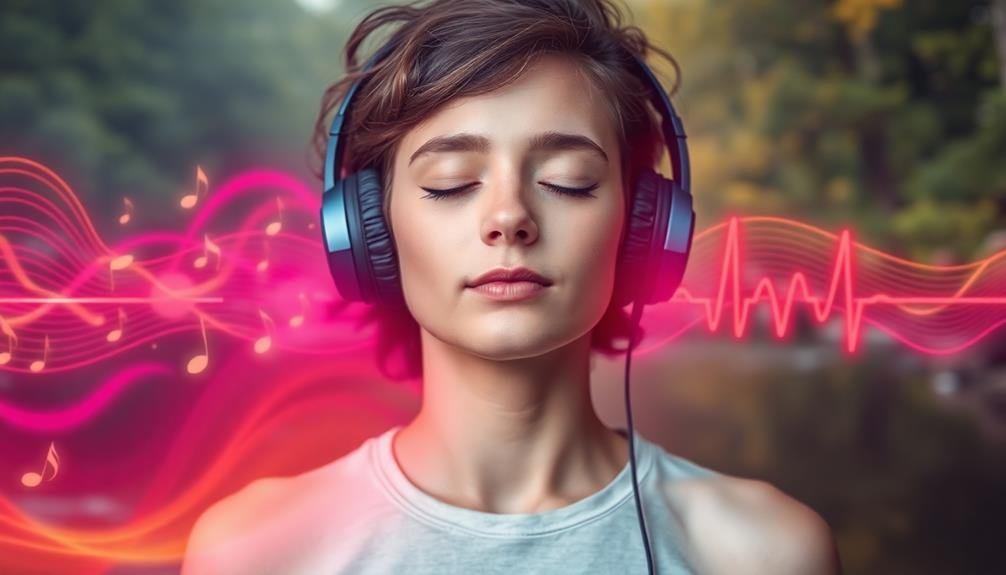Music eases panic during anxiety attacks by engaging multiple brain regions, triggering physiological and psychological responses that counteract anxiety symptoms. When you listen to soothing melodies, your brain releases neurotransmitters like dopamine and serotonin, enhancing mood and reducing stress. Your heart rate slows, blood pressure drops, and breathing patterns improve, promoting relaxation. Music also serves as a powerful distraction, breaking cycles of negative thoughts and grounding you in the present moment. It can evoke positive memories, provide a sense of control, and create emotional connections that comfort you during distress. Understanding these effects can help you harness music's full potential for anxiety relief.
Understanding Anxiety and Panic Attacks

Anxiety often creeps up on you when you least expect it. Your heart races, your palms sweat, and your mind floods with worries. This common mental health condition affects millions worldwide, manifesting in various forms, from generalized anxiety disorder to specific phobias.
Panic attacks, a severe manifestation of anxiety, can be particularly distressing. They're intense episodes of fear that peak within minutes, often accompanied by physical symptoms like chest pain, shortness of breath, and dizziness. You might feel a sense of impending doom or loss of control during these episodes.
Understanding the root causes of anxiety and panic attacks is essential. They can stem from genetic factors, brain chemistry imbalances, environmental stressors, or traumatic experiences. Recognizing your triggers and symptoms helps in managing and preventing these episodes.
It's important to note that anxiety and panic attacks, while frightening, aren't physically dangerous. They're your body's natural fight-or-flight response misfiring.
Learning coping strategies, such as deep breathing exercises, mindfulness techniques, and cognitive-behavioral therapy, can greatly reduce their impact on your daily life.
The Science Behind Music's Calming Effects
You'll find it fascinating how music affects your brain, body, and mind to reduce anxiety.
Your brain's response to music involves activating reward centers and releasing mood-enhancing neurotransmitters. As you listen, you'll experience physiological changes like decreased heart rate and lowered blood pressure, while psychologically, music can distract you from anxious thoughts and promote relaxation.
Brain's Response to Music
Through advances in neuroscience, researchers have uncovered fascinating insights into how our brains respond to music. When you listen to music, your brain activates multiple regions simultaneously, including those responsible for emotion, memory, and motor control. The auditory cortex processes the sound, while the limbic system, particularly the amygdala and hippocampus, handles emotional responses and memory formation.
Music triggers the release of neurotransmitters like dopamine, serotonin, and oxytocin, which are associated with pleasure, mood regulation, and bonding. This chemical cascade can help reduce stress and anxiety levels.
Your brain's rhythm-processing centers, such as the cerebellum and basal ganglia, synchronize with the music's beat, potentially influencing your heart rate and breathing patterns.
Interestingly, familiar music activates the default mode network, a set of brain regions linked to self-reflection and mind-wandering. This activation can help distract you from anxious thoughts.
Additionally, music engages the mirror neuron system, allowing you to empathize with the emotions conveyed in the music. This emotional connection can provide comfort and a sense of understanding during anxious moments.
Physiological Changes Induced
Beyond the brain's response, music induces significant physiological changes that contribute to its calming effects. When you listen to soothing music, your body undergoes a series of physical transformations that help alleviate anxiety symptoms. Your heart rate slows down, matching the rhythm of the music, which in turn reduces blood pressure and promotes a sense of relaxation.
Music also affects your breathing patterns. As you listen, you'll notice your breaths becoming deeper and more regular, increasing oxygen flow to your brain and muscles. This improved oxygenation helps combat the shallow, rapid breathing often associated with panic attacks.
Additionally, music stimulates the release of endorphins, your body's natural pain relievers and mood enhancers. These chemicals create a sense of well-being and can counteract the stress hormones produced during anxiety attacks. You'll also experience a decrease in muscle tension as your body responds to the calming sounds.
Lastly, music can lower cortisol levels, the hormone responsible for stress responses. This reduction helps your body return to a more balanced state, easing the physical symptoms of anxiety and promoting overall relaxation.
Psychological Impact Explained
While the physiological effects of music on anxiety are significant, its psychological impact is equally profound. When you're in the throes of an anxiety attack, music can serve as a powerful anchor, grounding you in the present moment and redirecting your focus away from distressing thoughts.
It's like a mental lifeline, offering a sense of familiarity and comfort in the midst of chaos.
Music's ability to influence your emotional state is well-documented. It can:
- Reduce feelings of isolation by creating a sense of connection
- Distract from negative thought patterns, breaking the cycle of rumination
- Evoke positive memories and associations, lifting mood
- Provide a sense of control over your environment and emotional state
Physiological Responses to Soothing Melodies

The human body responds in remarkable ways to soothing melodies. When you listen to calming music during an anxiety attack, your physiological state begins to shift. Your heart rate, which may have been racing, starts to slow down and synchronize with the rhythm of the music. This phenomenon, known as entrainment, helps regulate your pulse and blood pressure.
You'll notice your breathing becomes deeper and more regular as the music's tempo guides your respiratory rate. This controlled breathing activates your parasympathetic nervous system, countering the fight-or-flight response triggered by anxiety. As a result, you'll feel your muscles relax and tension dissipate.
Soothing melodies also affect your brain chemistry. They stimulate the release of dopamine, a neurotransmitter associated with pleasure and reward. This flood of dopamine can help counteract the stress hormones coursing through your body.
Additionally, listening to calming music lowers cortisol levels, further reducing stress and promoting relaxation.
The auditory stimulation provided by music can also serve as a distraction, redirecting your focus away from anxious thoughts and physical sensations. This shift in attention allows your body to reset and return to a more balanced state.
Psychological Impact of Relaxing Tunes
Relaxing tunes don't just affect your body; they also have a profound impact on your mind. When you're experiencing anxiety, soothing music can help shift your focus away from worrisome thoughts and redirect your attention to more calming stimuli. This mental redirection can greatly reduce the intensity of anxious feelings and help you regain a sense of control.
Music's psychological effects on anxiety are multifaceted:
- Distraction: Engaging with music occupies your mind, leaving less room for anxious thoughts.
- Emotional regulation: Calming tunes can help stabilize your mood and promote positive emotions.
- Cognitive restructuring: Music can change your thought patterns, replacing negative self-talk with more constructive ideas.
- Memory association: Over time, you may associate certain songs with relaxation, making them powerful anxiety-reduction tools.
Choosing the Right Music

Selecting appropriate music for anxiety relief is essential to maximizing its therapeutic benefits. When choosing music to calm your anxiety, consider your personal preferences and emotional responses to different genres. Opt for songs with slower tempos, typically between 60-80 beats per minute, which can help slow your heart rate and breathing.
Classical music, particularly works by Mozart, Bach, and Beethoven, has been shown to reduce stress and promote relaxation. Nature sounds, ambient music, and instrumental tracks can also be effective in soothing anxiety. These types of music often lack lyrics, which can be distracting or trigger unwanted thoughts. Instead, they create a peaceful atmosphere that encourages mindfulness and tranquility.
Create playlists specifically for anxiety relief, incorporating a mix of familiar and new songs that you find calming. Don't hesitate to experiment with different styles and artists to discover what works best for you.
Remember that your musical preferences may change over time, so be open to adjusting your anxiety-relief playlist as needed. Ultimately, the most effective music for managing anxiety is the kind that resonates with you personally and helps you feel more at ease.
Creating a Calming Playlist
Once you've identified the types of music that help alleviate your anxiety, it's time to assemble your personalized calming playlist. Consider including a mix of instrumental and vocal tracks, focusing on slower tempos and soothing melodies. Pay attention to the lyrics, ensuring they're positive or neutral rather than triggering.
Remember, what works for others mightn't work for you, so trust your instincts and emotional responses when selecting songs.
To create an effective calming playlist:
- Start with 15-20 songs and gradually expand
- Include tracks of varying lengths to accommodate different situations
- Organize songs in a logical order, perhaps starting with more upbeat tunes and shifting to slower, more relaxing ones
- Regularly update your playlist to prevent boredom and maintain its effectiveness
Don't hesitate to experiment with different genres and artists. You might discover unexpected gems that resonate with you.
Keep your playlist easily accessible on your phone or preferred music player, so you can turn to it whenever anxiety strikes. By curating a personalized collection of calming music, you're equipping yourself with a powerful tool to manage anxiety and promote relaxation in various situations.
Incorporating Music Into Coping Strategies

Music serves as a powerful ally in your anxiety management toolkit. When incorporating music into your coping strategies, consider integrating it with other relaxation techniques. For example, pair deep breathing exercises with slow, rhythmic music to enhance their calming effects.
You can also use music as a grounding tool during mindfulness practices, helping you focus on the present moment. Create specific playlists for different anxiety-inducing situations, such as pre-presentation jitters or social gatherings. This allows you to quickly access appropriate music when needed.
Don't limit yourself to just listening; try engaging with music actively through singing, humming, or playing an instrument. These activities can redirect your focus and provide a sense of control. Use music as a preventive measure by incorporating it into your daily routine.
Start your day with uplifting tunes or wind down with relaxing melodies before bed. Consider using music-assisted progressive muscle relaxation or guided imagery exercises to further enhance its anxiety-reducing benefits.
Long-Term Benefits of Musical Therapy
You'll find that engaging in musical therapy over time can considerably improve your emotional regulation skills.
As you continue with this practice, you'll likely notice enhanced cognitive function, including better memory and increased focus.
These long-term benefits can contribute to an overall reduction in anxiety and improved mental well-being.
Improved Emotional Regulation
Developing emotional regulation skills is a key long-term benefit of musical therapy for those struggling with anxiety. As you engage in musical activities, you'll learn to recognize and manage your emotions more effectively. This improved emotional regulation can help you navigate stressful situations with greater ease and confidence.
Through regular musical therapy sessions, you'll develop a set of tools to control your emotional responses. These tools can include:
- Deep breathing techniques synchronized with rhythm
- Mindfulness practices enhanced by melodic focus
- Emotional expression through lyric writing or improvisation
- Stress reduction through active listening and sound immersion
You'll find that these skills transfer to your daily life, allowing you to respond to anxiety triggers more calmly. Instead of becoming overwhelmed, you'll be able to identify your emotions and choose appropriate coping strategies. This increased self-awareness and control can lead to a significant reduction in the frequency and intensity of anxiety attacks.
Moreover, the confidence you gain from mastering musical skills can boost your overall self-esteem, further enhancing your ability to manage anxiety. As you continue to practice and improve, you'll develop a sense of accomplishment that extends beyond the therapy sessions.
Enhanced Cognitive Function
While engaging in musical therapy for anxiety relief, you'll likely notice improvements in your cognitive function over time. Regular exposure to music can enhance your memory, attention span, and problem-solving skills. You'll find yourself better able to focus on tasks and retain information, even when you're not actively listening to music.
Music's impact on your brain extends beyond emotional regulation. It stimulates various cognitive processes, leading to long-term benefits in your mental acuity. Here's a breakdown of how music therapy can boost your cognitive abilities:
| Cognitive Function | How Music Helps | Benefits |
|---|---|---|
| Memory | Activates multiple brain regions | Improved recall and learning |
| Attention | Provides a structured auditory environment | Enhanced focus and concentration |
| Problem-solving | Encourages creative thinking | Increased ability to find solutions |
| Language skills | Engages language processing areas | Better verbal fluency and comprehension |
Frequently Asked Questions
Can Listening to Music Prevent Anxiety Attacks Altogether?
While music can help manage anxiety, it can't completely prevent attacks. You'll find it's a useful tool to calm yourself, but it's not a cure-all. Combine it with other coping strategies for better results.
Are Certain Instruments More Effective for Calming Anxiety Than Others?
You'll find that certain instruments can be more effective for calming anxiety. Wind instruments like flutes and pan pipes often soothe, while string instruments like harps and acoustic guitars can create a relaxing atmosphere. Ultimately, it's about personal preference.
How Long Should One Listen to Music to Reduce Anxiety Symptoms?
You'll find that listening to music for 20-30 minutes can considerably reduce anxiety symptoms. However, you're unique, so experiment with shorter or longer durations. Pay attention to how you feel and adjust accordingly for the best results.
Can Creating Music Be as Beneficial as Listening for Anxiety Relief?
Creating music can be just as beneficial as listening for anxiety relief. You're actively engaging your mind and expressing emotions. It's a form of self-therapy that allows you to channel your feelings creatively, potentially reducing stress and anxiety.
Is There a Difference Between Recorded Music and Live Performances for Anxiety?
You'll find both recorded and live music can help with anxiety, but live performances may offer additional benefits. The shared experience, visual stimulation, and unique energy of live music can enhance its anxiety-reducing effects for you.
In Summary
You've now learned how music can be a powerful tool in managing anxiety and panic attacks. By understanding the science behind its calming effects and choosing the right tunes, you're equipped to create a soothing playlist tailored to your needs. Remember, incorporating music into your coping strategies can offer both immediate relief and long-term benefits. Don't hesitate to explore this natural, accessible method to ease your anxiety and improve your overall well-being.





Leave a Reply